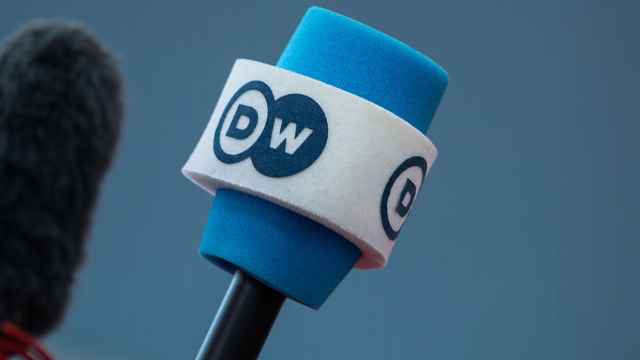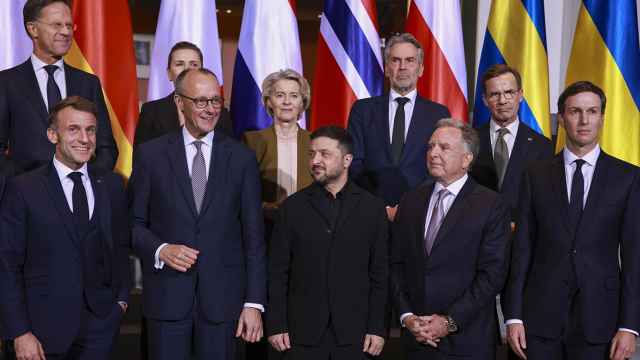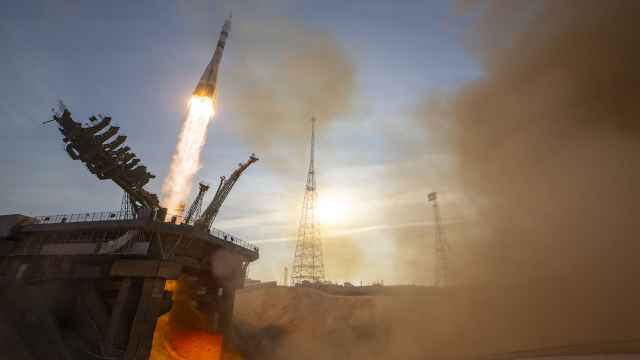Prime Minister Vladimir Putin published the fourth in a series of newspaper articles Monday, and in it, the odds-on favorite to win the presidency addresses the middle class and calls for "true democracy."
Putin's new article, consisting of 4,000 words, is titled "Democracy and the Quality of State." It appeared on the front page of the influential Kommersant daily.
According to Putin, in the 1990s the country brought in from the West new democratic models, which soon "were occupied by local and central elites of oligarchs."
As a result, Putin says, instead of freedoms the country got "behind-the-scenes fights between clans" that made the majority distrust democratic values. In addition, people at that time had a lot of illusions and "were used to waiting for mercies from the state."
"A true democracy can't be established at one stroke, can't be copied from a foreign model," Putin says in the beginning of the article.
He was clearly addressing the burgeoning middle class, which has been increasingly vibrant at the mass opposition protests. Although he never mentions the rallies in the article, he hints that his rule laid the groundwork for them by saying they are "the result of our efforts."
"Today our society is very different from that of the early 2000s," Putin wrote. "Many people are becoming more well-off, more educated and more demanding."
On Saturday, tens of thousands of people took part in an opposition demonstration calling for reforms and fair elections.
One of the key specific measures introduced in the article is a requirement that the State Duma discuss initiatives backed by at least 100,000 people in Internet petitions, thus acknowledging the importance of open online discussions.
Nevertheless, he didn't mention that his party, United Russia, holds a majority of seats and can easily reject an initiative unfavorable to the authorities.
In the article, he speaks about the importance of "Internet democracy," though Putin himself repeatedly said he does not use the Internet very much, indicating that he doesn't care much about criticism of his policy there.
He continues by touching on one of the most crucial issues: corruption. "The fight against corruption should become a national cause, not a subject of political speculations," Putin says.
But he insinuated that he would resist calls to clean house, and he didn't specify his strategy for combating corruption.
Putin proposed an initiative to establish administrative courts that would deal with disputes involving state officials, as well as online broadcasts and publicly available transcripts of court hearings.
He also said Russia should reform the selection of the chairman and auditors of the Russian Audit Chamber to boost transparency. He suggested that they should not be appointed by the president but by the State Duma Council with the consent of all factions.
Senior United Russia member Andrei Isayev called the article "a manifesto for the development of true democracy," the party reported on its official website.
Putin's previous articles in the series were similarly wide-ranging. The first one was published in Izvestia and dealt with Russia's challenges. The second appeared in Nezavisimaya Gazeta and was about the nationality issue. And the third one, in Vedomosti, concerned the country's economy.
Last week, independent elections watchdog Golos said Putin had broken electoral laws by publishing the articles, which it said were part of Putin's campaign platform.
But the Central Elections Commission later stated that Putin's articles are information materials, not campaigning.
The presidential election is scheduled for March 4, and Putin is expected to win in the first round, according to polling.
Alexei Makarkin, a political analyst for the Center of Political Technologies, said the new article proves that Putin recognizes the importance of the middle class and has to make concessions.
"The article mentions a bunch of good initiatives, but the question remains: Will they be fulfilled?" Makarkin said in a telephone interview. "To succeed, the state needs an influential mass media and independent courts."
On the one hand, Putin says that public institutions should be strengthened. But on the other hand, the authorities "have very strict criteria on which organizations are good and which are bad," Makarkin said.
The fact that Putin has recognized the importance of the Internet community means that "the outcome of the election seriously bothers him," political analyst Dmitry Oreshkin told Kommersant FM radio station.
A Message from The Moscow Times:
Dear readers,
We are facing unprecedented challenges. Russia's Prosecutor General's Office has designated The Moscow Times as an "undesirable" organization, criminalizing our work and putting our staff at risk of prosecution. This follows our earlier unjust labeling as a "foreign agent."
These actions are direct attempts to silence independent journalism in Russia. The authorities claim our work "discredits the decisions of the Russian leadership." We see things differently: we strive to provide accurate, unbiased reporting on Russia.
We, the journalists of The Moscow Times, refuse to be silenced. But to continue our work, we need your help.
Your support, no matter how small, makes a world of difference. If you can, please support us monthly starting from just $2. It's quick to set up, and every contribution makes a significant impact.
By supporting The Moscow Times, you're defending open, independent journalism in the face of repression. Thank you for standing with us.
Remind me later.





